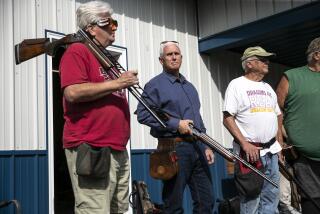Angry GOP Right Looking to Buchanan : Politics: ‘Pro-family’ coalition considers endorsement of the commentator. They say Dole, Gramm aren’t addressing social issues.
- Share via
WASHINGTON — Angered that the leading contenders for the 1996 GOP presidential nomination are backing away from social issues, a group of prominent social conservatives is actively considering a joint endorsement of conservative commentator Patrick J. Buchanan.
No final decision has been made on such a move, which could reshape the early dynamics of the GOP presidential contest dramatically. But participants said that the group--which includes leading conservative activists Gary Bauer and James Dobson--is considering such an endorsement as a dramatic means of expressing its unhappiness with the apparent decisions by Sens. Bob Dole of Kansas and Phil Gramm of Texas, the current front-runners, to downplay discussion of abortion and other hot-button social issues.
“There is a growing desire for the entire pro-family movement to endorse one candidate . . . and certainly many people believe that candidate should be Buchanan,” said Bauer, president of the Family Research Council, a conservative think tank in Washington.
“Evangelical voters are the biggest element in the party and they want to be treated like it,” said Phyllis Schlafly, president of the Eagle Forum and another participant in the discussions. “It just appears Dole and Gramm don’t represent that enormous constituency.”
A joint Buchanan endorsement from leading social conservatives could greatly complicate the calculations for Gramm, who is counting on the support of the party’s most ideological elements to overtake Dole.
But frustration over the leading candidates’ posture on abortion could have longer-term implications for the party as well. In addition to looking at Buchanan, the group is also considering overtures to Ross Perot or former Pennsylvania Gov. Robert P. Casey, who opposes abortion and is contemplating a Democratic primary challenge against President Clinton next year.
Bauer is a former domestic policy adviser to Ronald Reagan, whose think tank has become increasingly influential among conservative policy-makers. Dobson is a Christian family counselor who hosts a daily talk radio show and directs a national organization called Focus on the Family. In addition to those two and Schlafly, the discussions have also included Beverly La Haye, founder of Concerned Women for America--one of the larger groups on the right.
The Christian Coalition, the leading organization of social conservatives, has participated in the discussions but is unlikely to endorse any candidate in the 1996 primaries. Even so, a joint Buchanan endorsement from some or all of the other conservative leaders could send a powerful signal to the bulging constituency of socially conservative, “born-again” Christians--a group that constitutes from 25% to 43% of the Republican primary electorate, depending on how they are defined.
“It would send a terrific message,” said Angela (Bay) Buchanan, the chairman of her brother’s presidential campaign. “This would be a clear signal that Pat is the choice of the social conservatives.”
Charlie Black, a senior strategist for Gramm, argued that it is unclear whether the group, even if it endorses Buchanan, could convince large numbers of voters to view the columnist as a viable nominee. “The question is how it would translate down to the grass roots,” Black said.
The conservative group, which last met at Bauer’s offices in Washington about three weeks ago, does not appear near a final decision. “I have not discussed any follow-up strategy with any of the leaders,” Schlafly said. “I don’t know anything about a planned endorsement of Buchanan.”
Indeed, sources said, doubts about Buchanan’s electability and concern about his historic criticism of Israel--a top foreign policy priority for many religious conservatives--could pose impediments to a final endorsement.
Those obstacles, however, do not appear insuperable. Discussions among the conservative groups remain “very fluid,” according to a participant, who said that the group could “go through the summer without a final strategy.” But the source added that, if the GOP contenders do not take a more aggressive stand on limiting abortion “by late summer or early fall, it is very likely you will see something like this (Buchanan endorsement) or something even more unnerving for the Republican leadership as a whole.”
In the three-corner calculations of primary politics, a shift of social conservatives toward Buchanan could benefit Dole as much as it does the fiery conservative columnist himself.
Dole has reached out aggressively to Christian activists. In a speech Tuesday, Dole endorsed voluntary school prayer and sharply criticized the entertainment industry, saying that it “poisons the minds of our young people.” But even so, Dole’s instincts toward moderation and compromise make him unlikely to emerge as a favorite of the religious conservatives, according to activists in the movement.
With Dole running well among moderates and competitively among economic conservatives--the two other broad components of the party--some in his camp are saying that they would be satisfied to prevent the religious conservatives from coalescing around Gramm. A social conservative endorsement of Buchanan could advance that largely defensive goal of Dole’s.
“If that group is heavily fragmented or starts moving to Buchanan rather than Gramm, it becomes very difficult for Gramm to get the votes he needs to overtake Dole,” said Bill McInturff, a GOP pollster working with Dole.
These maneuvers have their roots in mounting frustration among some social conservatives about the lack of priority placed on the right’s traditional social agenda since last fall’s election by the leading candidates, and indeed the GOP majorities in Congress. Focusing both on economic issues and other values issues like crime and welfare, neither the GOP legislative majorities nor the leading 1996 contenders have emphasized opposition to abortion or to civil rights protections for homosexuals--top priorities for religious conservatives through the 1980s.
In particular, Gramm--a staunch abortion opponent in his congressional voting record--has angered social conservatives by indicating that, if elected, he would not seek to overturn the 1973 Supreme Court decision guaranteeing the right to abortion. Gramm, who is known for sharp elbows, compounded the problem at a late March meeting at which he angered Bauer, Dobson and other social conservatives by brusquely dismissing their suggestions that he speak out more forcefully on social concerns.
“That meeting was an enormous missed opportunity for Gramm,” said one person who was present. “It did not go well.”
More to Read
Get the L.A. Times Politics newsletter
Deeply reported insights into legislation, politics and policy from Sacramento, Washington and beyond. In your inbox three times per week.
You may occasionally receive promotional content from the Los Angeles Times.










